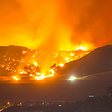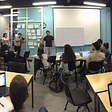Is Digital Technology part of the Climate solution or part of the problem?
The fundamental economic problem of scarcity is at the heart of most of the wars that have ever been fought. When the Greeks fought the Trojans, it was because they desired the secret knowledge that the Trojans had. When they won, the balance of power shifted to Greece. Though we are getting better, the problem of scarcity is as prevalent as ever; a quick glance at the geo-political landscape tells you all you need to know.
However, many people I speak with — including politicians — believe that we are in the process of leaving this materialistic age and entering a new epoch. One of integrated technologies, digitization, and smart automation, where the problem of scarcity is solved by embedded connectivity of technology throughout society. Industry 4.0 if you will.
Sounds good. I’m 100% all for visualizing a better future but I suspect its not quite that simple.
A quick scrutiny of the thesis and problems quickly reveal themselves: Won’t the digital age simply be a deeper form of materialism? Won’t we become ever more dependent upon rare earth metals, which in turn leads to more extractive processes and more environmental destruction?
Well, quite possibly unfortunately.
And those reasons only really scratch the surface. There is also the e-waste that will be created, inherently more hazardous by nature. Dealing with this will require more robust regulation and greater policy emphasis at all levels on developing the circular economy. Awareness of environmental trade-offs and responsible digitization will require a collective shift of mindset, so as not to compound our environmental problems.
All of these are significant challenges, not be underestimated. But if we really are to limit global temperature rises to below 1.5 degrees C by 2050 then wouldn’t it be more pertinent to adopt a ‘less is more’ approach? One where we do less, not try to do more and compound problems. Greater tech reliance requires greater electricity for example, which pushes up our greenhouse gas emissions. Such an approach could even be more palatable for society given the perception that technology is ‘part of the climate problem’.
I would argue not.
Climate change is incredibly complex and multi-faceted. If we are to genuinely have a chance of transitioning to net-zero, then technology and information systems will need to play a significant role in informing fair and balanced decisions, that reflect the physical and environmental realities of how we organise our societies. In other words, tech is at the vanguard of the solution.
This is becoming or has become apparent in many ways. For example:
The potential for IS to reduce pollution is considerable. With about 90% of greenhouse gases coming from burning fossil fuels, the necessity for transitioning to renewables is very apparent. Yet this will not be done without innovative new efficiencies in research, construction, site selection and use of renewable power infrastructure. This calls upon advances in geo-spatial sciences, modelling of land-use, modern building techniques, green engineering, and ongoing ecological research to name a few disciplines, all of which in turn, needs advanced IS to maximise utility. By thinking in this more holistic way, appropriate solutions can include genuine intent to resolve or minimise environmental impact, not just put profitability first.
Similarly, transport accounts for around 25% of GHG’s. Cutting these emissions is a multi-disciplinary challenge requiring both adaptation to and mitigation against the problem. Given that a voluntary return to the horse and cart seems unlikely, new thinking will need to be employed. Increased use of railroads for logistics, electric vehicles, public transport infrastructure will all require cross-disciplinary thinking and coordination via the use of advanced IS.
The likelihood of drastically reduced supply chains in the near future will not be enough to mitigate GHG’s by reducing transport. In this scenario it will become harder for richer nations to export their environmental externalities to poorer ones, therefore meaning more advanced modelling through IS will be a key component in bringing about a genuine circular economy that accounts for e-waste. This in turn should lessen the pressure on extractive industries for raw materials which create geo-political consequences in unstable parts of the globe.
Education has been the primary way in which people can learn to live more sustainably through learning, sharing and teaching online. That the climate issue has reached such prominence at all in popular discourse, is down in no small part to advances in communications bought about by digital technology. It has allowed the debate to naturally become multi-disciplinary and has contributed to significant changes in attitude and behaviour in a comparatively short space of time. Integrating technology into formal education has also demonstrably led to innovative outcomes for climate-based challenges, in everything from building materials to food production.
Technological innovations have also enabled remote working, having been quickly embraced by businesses, as new ways of working more efficiently and reducing overhead costs. This has ranged from small and medium enterprises right up to the giants of Silicon Valley. Households have access to ever more efficient technology that allows them to reduce energy consumption and save on outgoings.
The above examples are by no means exhaustive, and I dare say that you can call on other examples that I have not included here. However, it should be acknowledged that there is an inherent contradiction in the debate surrounding technological advances and the environment. What should be clear is that climate change is a massive problem that we will not solve simply by consuming much less. The world population continues to grow, needs to be fed and those in poverty will do what they need to get out of poverty. This puts digital technology as a key part of the solution, whether that is in mitigation measures, education, or something else. The alternative may well be a scrambling between nations for what little scarce resources remain.




